At HubSpot, we are optimistic about the future of SEO — but we're also preparing for many major shifts over the next year.

For one, Google's integration of generative AI into search will drastically change how users' find information, and will require companies to shift their entire end-to-end SEO strategy.
For another, many web analysts, SEO strategists, and writers are learning how to leverage AI to create stronger websites and more effective content. This will greatly alter how your competitors' approach content creation — and it should alter how you approach it, too.
Along with AI, Google's introduced a change to its search ranking factor from E-A-T to E-E-A-T. With that extra “E”, your expertise matters more than ever for ensuring your website shows up on search.
To figure out how to combat these challenges, we've reached out to experts at Semrush, Search Engine Journal, and HubSpot. Here, learn from SEO strategists and web analysts on how you should prepare for SEO in 2023 and beyond.
(Editor's note: The data in this post comes from HubSpot’s State of Web and SEO 2023 Data Report, which surveyed 400+ web analysts in June 2023.)
Predictions on the Future of SEO, and How You Should Prepare [Data + Expert Insights]
Click-through rates will drop drastically once Google's AI-powered snapshot is released.
It can be difficult to predict what will happen once AI is integrated into search engines. Most likely, similar to the release of featured snippets, you'll see a drop in click-through rates as users’ obtain answers to their questions via the generative AI search results page itself.
As Aja Frost, HubSpot's Director of SEO Global Growth, puts it, "Some folks on the HubSpot SEO team — myself included — have access to the new AI-powered snapshot beta. For nearly every query, the snapshot takes up a big percentage of the page pre-scroll and is designed to be highly interactive to facilitate searchers getting their answers without ever clicking through to a webpage."
She continues, “We anticipate that the AI-powered snapshot, much like featured snippets, will significantly depress click-through rates for the queries that it appears on.”
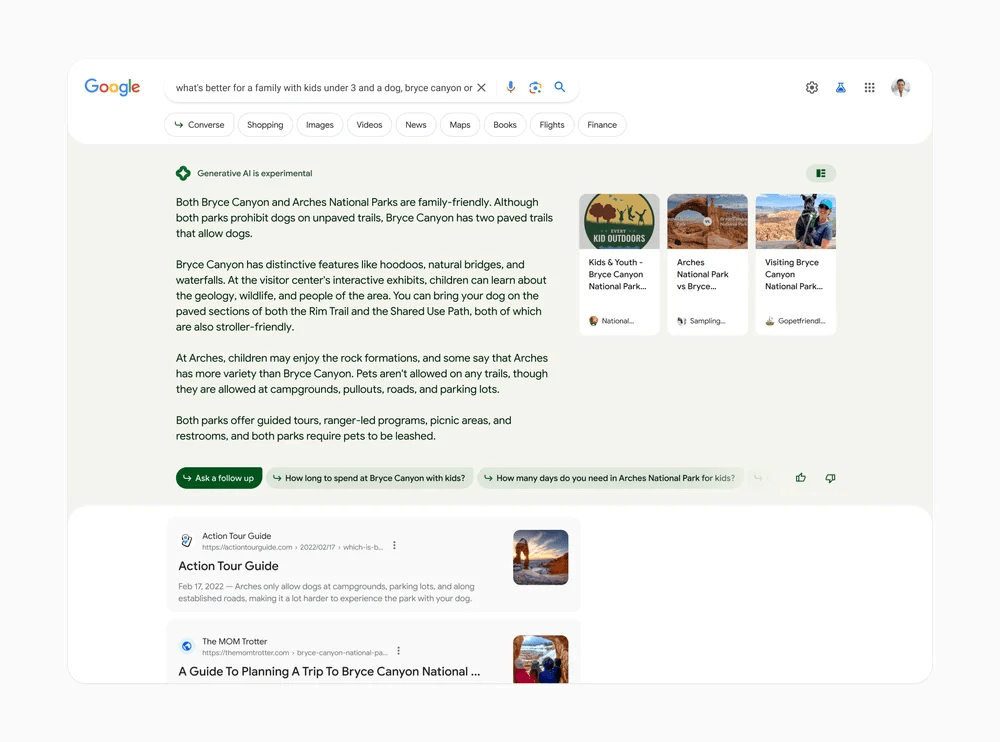
For instance, let's say you search "best hikes near me" and your first response — which takes up the entirety of the screen above-the-fold — is from Google’s generative AI feature. From there, you can click “Ask a follow up” to get additional information on trail lengths, mountain conditions, etc.
Which means any blog posts that might've supplied hiker’s with local information will be used to generate the information a user sees in the AI snapshot, but those websites won't receive the traffic.
Search engines will hit new peaks when it comes to users.
And yet, despite all of that, roughly 70% of web analysts predict their blogs will get more traffic than before when AI is integrated into search engines, while just 9% predict a drop in traffic.
So — does this mean web analysts are wrong? Not at all.
First, web analysts assume that, with a stronger user experience, more people will turn to search. In fact, roughly three-fourths of web analysts believe that people will use search more in 2024 than ever before.
And, ultimately, more people on search engines means more potential traffic.
Second, web analysts are correct that your blog traffic could go up as a result of the influx of users on search engines … depending on the type of content you create. Posts that highlight an interesting opinion or human perspective on a topic will become invaluable, since AI can't push a conversation forward or provide a unique point-of-view. It can only reiterate what has already been said.
Which leads me to my next point …
The type of content that performs best will change tremendously over the next year.
HubSpot's Frost told me: “As a result of the AI evolution, there is an exponential increase in the amount of AI-written, low-value content. And, in response to that, Google is prioritizing first-person, credible, personality-driven content.”
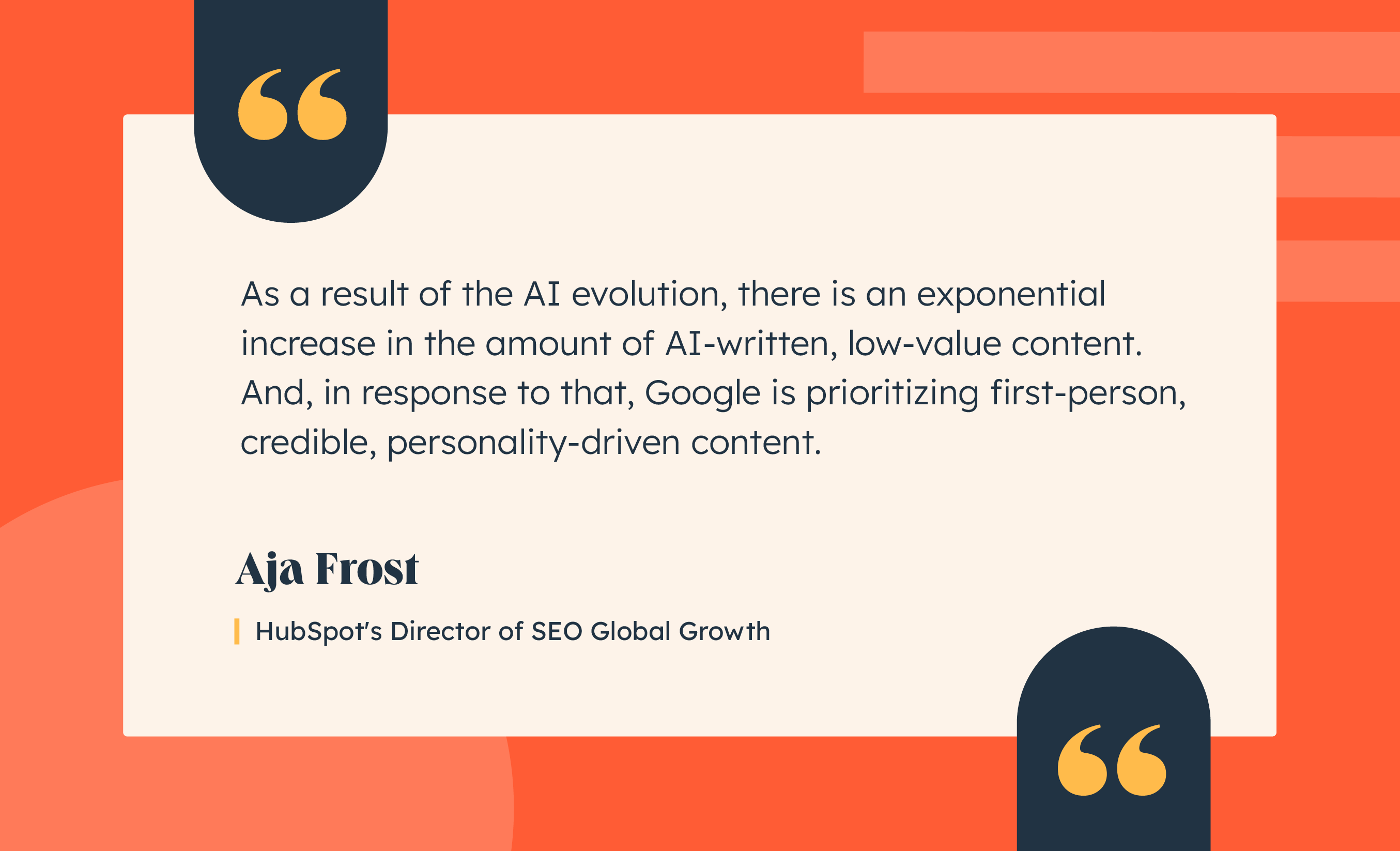
The shift to personality-driven content makes sense. If Google's consumers are flooded with low-value AI content, Google knows:
- The content isn't going to resonate with their audience, and
- Their AI models won't have enough new information to keep learning and adapting.
So what does this mean for SEO? For Frost and her SEO team at HubSpot, it means drastically increasing their investments in authoritative, human-first perspectives. And it means a reimagining of HubSpot's existing strategy, with a greater emphasis on perspective-driven content and emerging channels.
Human-first perspectives will win over more traditional, educational posts.
Frost told me that now, there is no distinction for her between SEO and editorial. For a post to rank, it needs to meet a certain criteria for both.
She says, “That means looking at every piece of content and asking, 'How do we make this a really unique, compelling piece of content that you can't find anywhere else on the web? And how can we ensure it's written by someone who has unique expertise on the topic?'”
At HubSpot, we're optimistic that this is going to be a positive change for both businesses and search users. But that doesn’t mean it isn't challenging. Depending on the type of content you’ve relied on in the past, this could mean a complete revamp of your SEO strategy.
For instance, if most of the content on your website is educational and impartial, you might need to shift to creating more perspective-driven content that moves the conversation forward.
Sure, “How to Create a Marketing Strategy” might not rank as well once you can find that answer within generative AI — but “Expert Insights on Creating A Powerful Marketing Strategy [+ New Data]” or “Why We Built a Brand-New Marketing Strategy from Scratch” will.
Because these are human-led conversations, and people will always crave human-led conversations — both online, and off.
Web analysts predict Trustworthiness to become the most important ranking factor in the SERPs.
When it comes to Google’s E-E-A-T, web analysts say Trustworthiness will become the most important for ranking highly on SERPs, followed by Expertise, Experience, and Authoritativeness.
It makes sense that Trustworthiness will continue to matter most, since Trustworthiness is essentially the sum-total of the other three rating factors. In other words, your website's rating for expertise, experience, and authoritativeness helps Google dictate how trustworthy your website is overall.
I spoke with Katie Morton, Search Engine Journal's Senior Managing Growth Editor, to learn her tips for increasing trustworthiness.
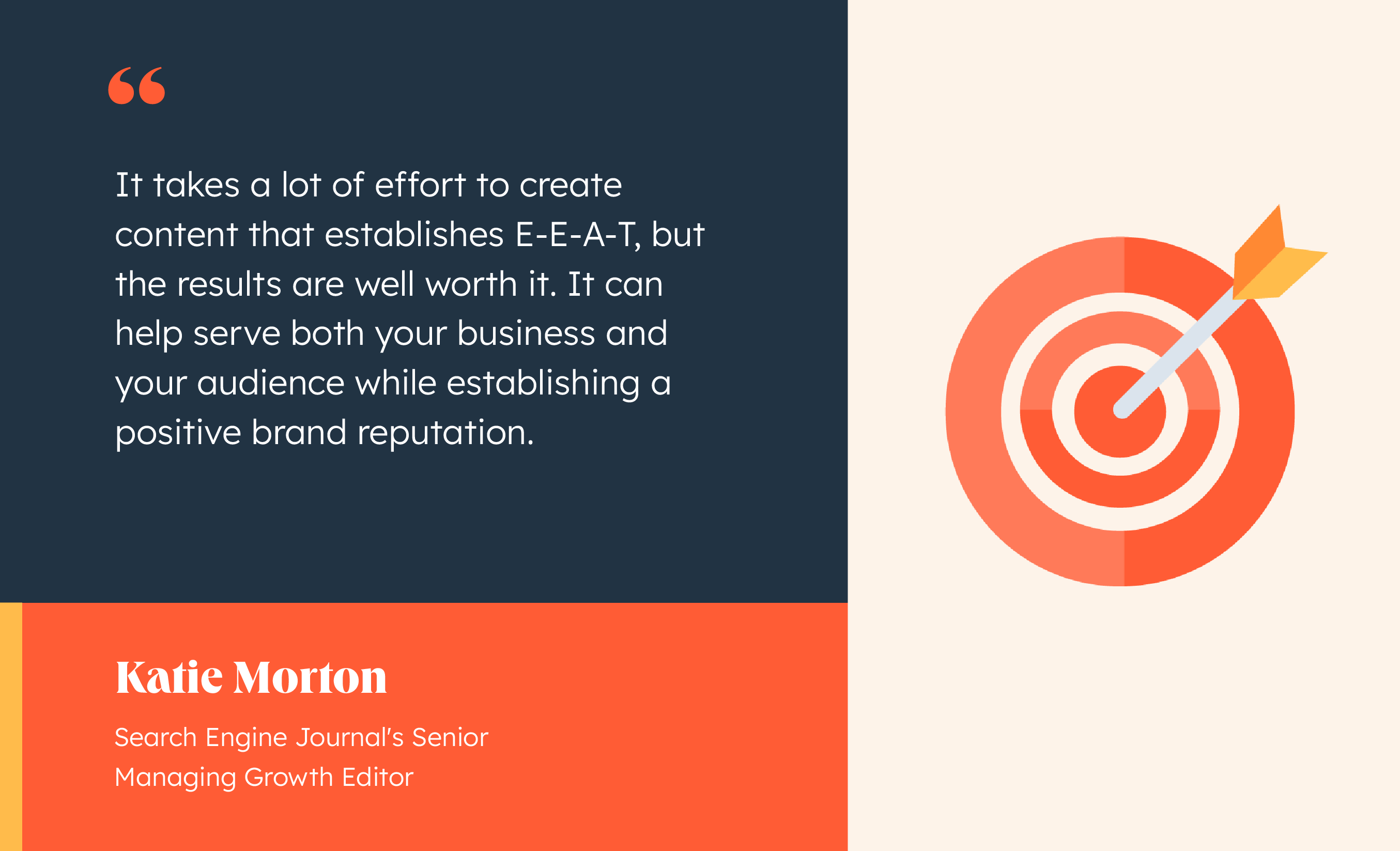
She told me, "Since Experience, Expertise and Authoritativeness support Trust, it’s best to look at the whole of the E-E-A-T concept, rather than focusing on any single aspect of the acronym."
That said, Morton points out that Google's Search Quality Rater Guidelines specifically call out the following three points to increase Trust:
- E-commerce sites with secure online payment systems and reliable customer service
- Honest product reviews meant to inform rather than solely to drive purchases
- Accurate content about Your Money or Your Life (YMYL) topics to prevent harm
She continues, "For companies looking to increase trustworthiness, again, it’s important to address all aspects of E-E-A-T. Here are my suggestions":
- Expert Authors: Source content from authors who have direct experience, a depth of knowledge, and expertise in the topic they are writing about. Anyone could Google a subject and write an article about it; but if the writer isn’t a subject matter expert, this doesn’t establish E-E-A-T. Having recognized experts and authorities in your industry as authors on your site can boost the credibility of your website and brand. On your website, provide bios of your authors and content creators that include their expertise, experience, and credentials.
- Accurate Content From Trusted Sources: Publish truthful and well-researched content that cites credible sources. Support claims via the experience and expertise of the author’s first-hand knowledge, with research and statistics from trustworthy sources, or both.
- Originality and Value: Ensure that your content is original, substantial, comprehensive, and provides valuable insights. Content that provides value to users is more likely to be shared. When a piece of content gets positive attention in the form of shares and backlinks, it can lend a sense of authority when your content is cited as a trusted source.
Morton adds, "It takes a lot of effort to create content that establishes E-E-A-T, but the results are well worth it. If you follow these suggestions, you will also create Helpful Content, which Google strongly encourages. This can help serve both your business and your audience while establishing a positive brand reputation."
Social search and alternative platforms will continue to rise in popularity.
Search engines are still dominant, but social search is growing in popularity in 2023, especially among Gen Z, Millennials, and Gen X.
In fact, 31% of consumers use social search when looking for answers to questions online, and 1 in 4 consumers age 18-54 actually prefer social search over search engines.
This could have a major impact on the future of SEO in terms of shifting your focus from Google to Instagram, TikTok, and other social platforms.
Marketers who optimize their accounts for social search have three top strategies:
- Include relevant keywords and hashtags in your social posts.
- Include relevant keywords and hashtags in your bio.
- Make sure that your username is easy to search for.
I've seen the power of social search first-hand. When I hear about a new brand, I don’t Google them anymore — I search for their Instagram account. And oftentimes, their social media page is the determining factor in whether I end up purchasing one of their products.
While it's early days, social media might someday take the lead when it comes to product discovery. Many users prefer visual over text, so it makes sense that users’ might not want to read a lengthy webpage on a product: They just want to see it in-action.
Additionally, SEO experts are leaning more heavily into multimedia content to expand beyond search when it comes to opportunities for reaching audiences. Which makes sense: During volatile times, it's critical your business becomes adaptable and you learn how to find new avenues to obtain traffic and leads.
As Frost told me, “At HubSpot, we are dramatically increasing our investment in other types of media, like video, podcasts, newsletters, and types of media that will be far less affected by the changes in search happening on Google.”
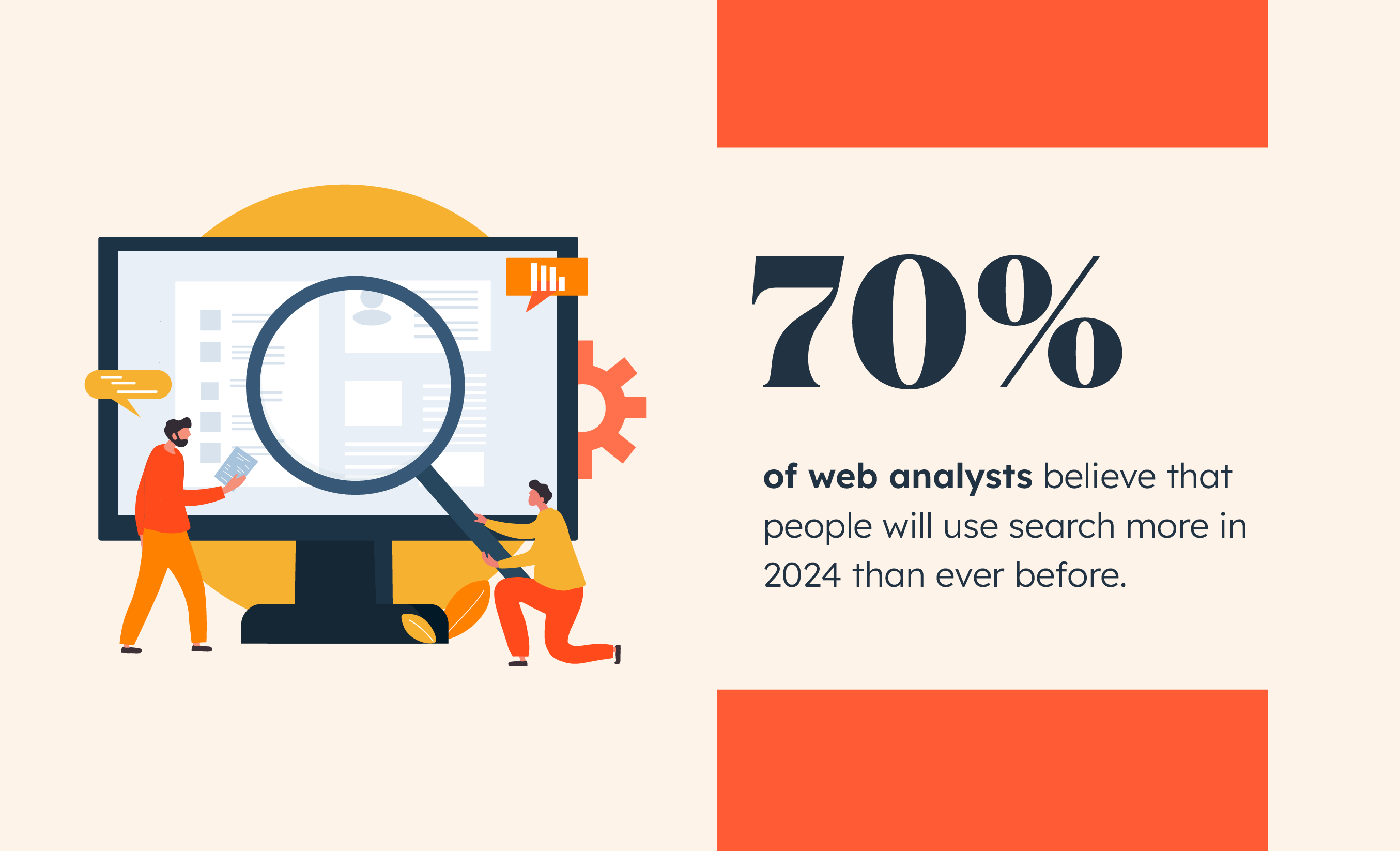
AI will change how SEOs and content creators do their jobs.
And finally, for the least surprising prediction in this list: AI will change how SEOs and creators do their work.
In fact, half of blog writers already use AI, and 74% of web analysts say it makes their content perform better and rank higher on the SERPs.
Over 50% of web analysts are also already incorporating AI tools into their workflow. Some of these analysts are gradually testing it and comparing results to performance without AI, while other analysts are building entirely new teams to leverage AI.
In particular, these web analysts are using AI for specific tasks, including keyword research, automating tedious tasks, optimizing their website, and idea generation.
When used correctly, AI can drastically improve an SEO team's strategy. Which is why it’s critical, as you consider how you might shift your strategy to meet these new challenges, that you work with AI, not against it.
... And it will greatly improve marketers' web optimization strategies.
Kyle Byers, Director of Organic Search at Semrush, told me there are innumerable ways marketers' can leverage AI. As he puts it, "AI is incredibly powerful and flexible in what it can help marketers accomplish — from purpose-built tools like our own ContentShake (AI content generator app) and SEO Writing Assistant, to general chat-based interfaces like ChatGPT, Bing Chat, and Google's Bard."
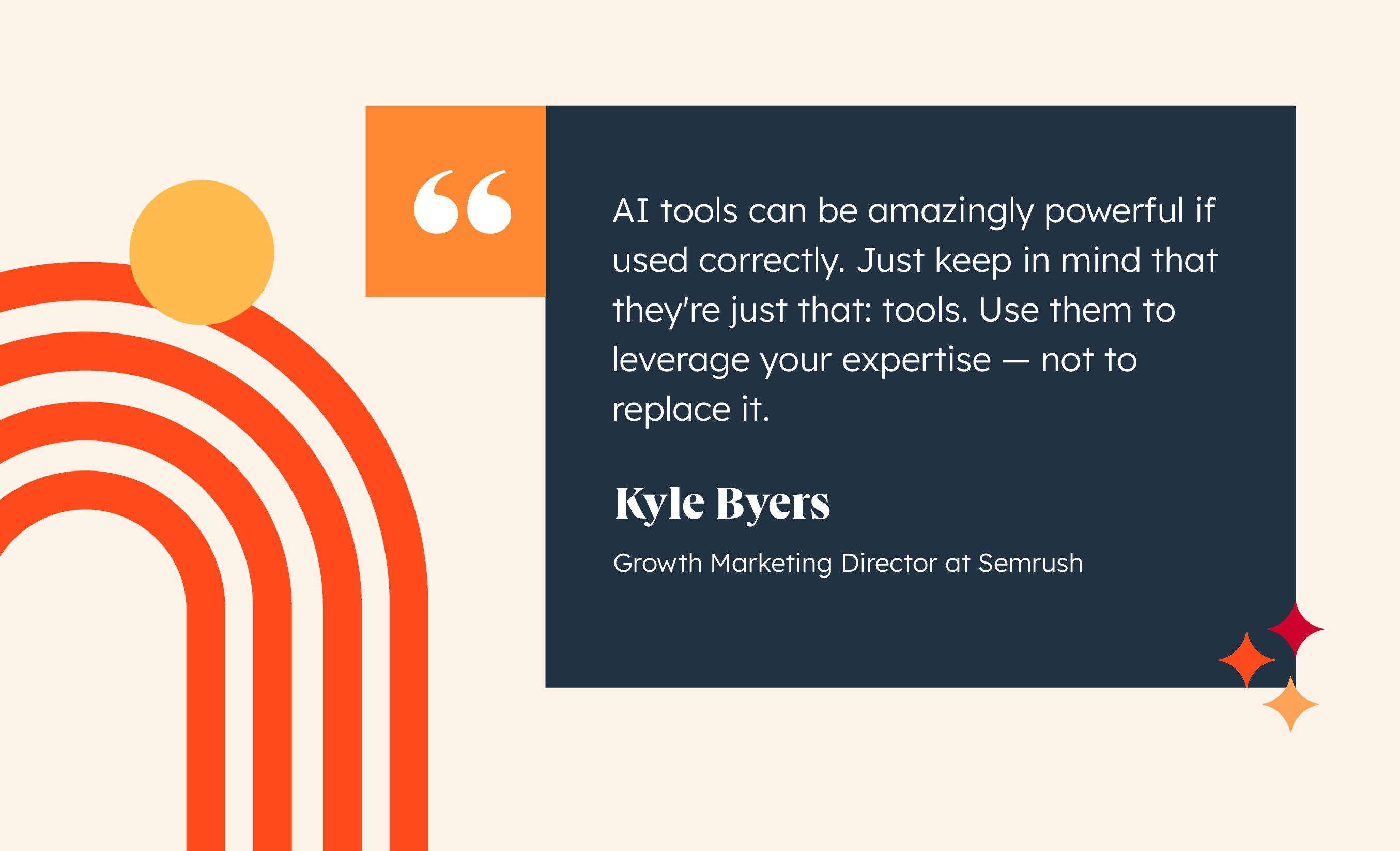
AI can also help marketers optimize their websites.
Here are some of the ways Byers suggests marketers leverage AI for web optimization:
- Conversion copywriting. (“Act as a tech-savvy small business owner who is shopping for accounting software. Grade the following landing page headlines on a scale of 1 to 10 based on how likely they are to make you want to try or purchase my product, then draft five new headline ideas that would be more compelling.”)
- Rephrasing content. For example, simplifying a long paragraph or sentence to meet an 8th-grade reading level. Or rewriting content to make it more unique, to strike a different tone, or to follow your brand’s style guide.
- Getting “unstuck” with content writing. (“Help me finish the following paragraph.”)
- Brainstorming additional angles to add to your content. (E.g. “Act as a sales manager who wants to develop an internal training program for improving your team’s sales skills. What important subtopics or angles are missing from the following content, which you would want to learn more about?”)
- Quickly drafting a list of 10 possible title tags and meta descriptions for a given webpage.
- Generating Schema markup. (E.g. “Generate FAQPage Schema markup for the following FAQs.”)
- Generating hreflang tags for different languages/locations.
- Translating content from one language to another.
- Generating regular expressions (for example, to use with Google Search Console or Google Analytics).
- Generating new robots.txt rules, and also help understanding existing robots.txt rules.
He adds, "AI tools can be amazingly powerful if used correctly. Just keep in mind that they're just that: tools. Use them to leverage your expertise — not to replace it."
(Interested in trying Semrush for yourself? Click here for an exclusive extended 14-day PRO free trial for HubSpot readers.)
The Next Evolution of SEO
AI is here to stay, and with it comes a new dawn of SEO. As a content creator long-trained in the art of writing for SEO, I'm personally thrilled about this evolution. It will require businesses to recalibrate and put innovative, novel, human-first perspectives ahead of rote, cut-and-dry content.
As a marketer, nothing could make me happier.
Curious about the other posts in this Series? Check out:










![8 SEO Challenges Brands Face in 2023 [HubSpot Blog Data]](https://blog.hubspot.com/hubfs/seo%20challenges_featured.png)
![Should Marketers Optimize for Bing? [Data + Expert Tips]](https://blog.hubspot.com/hubfs/BING-SEO%20%281%29.png)